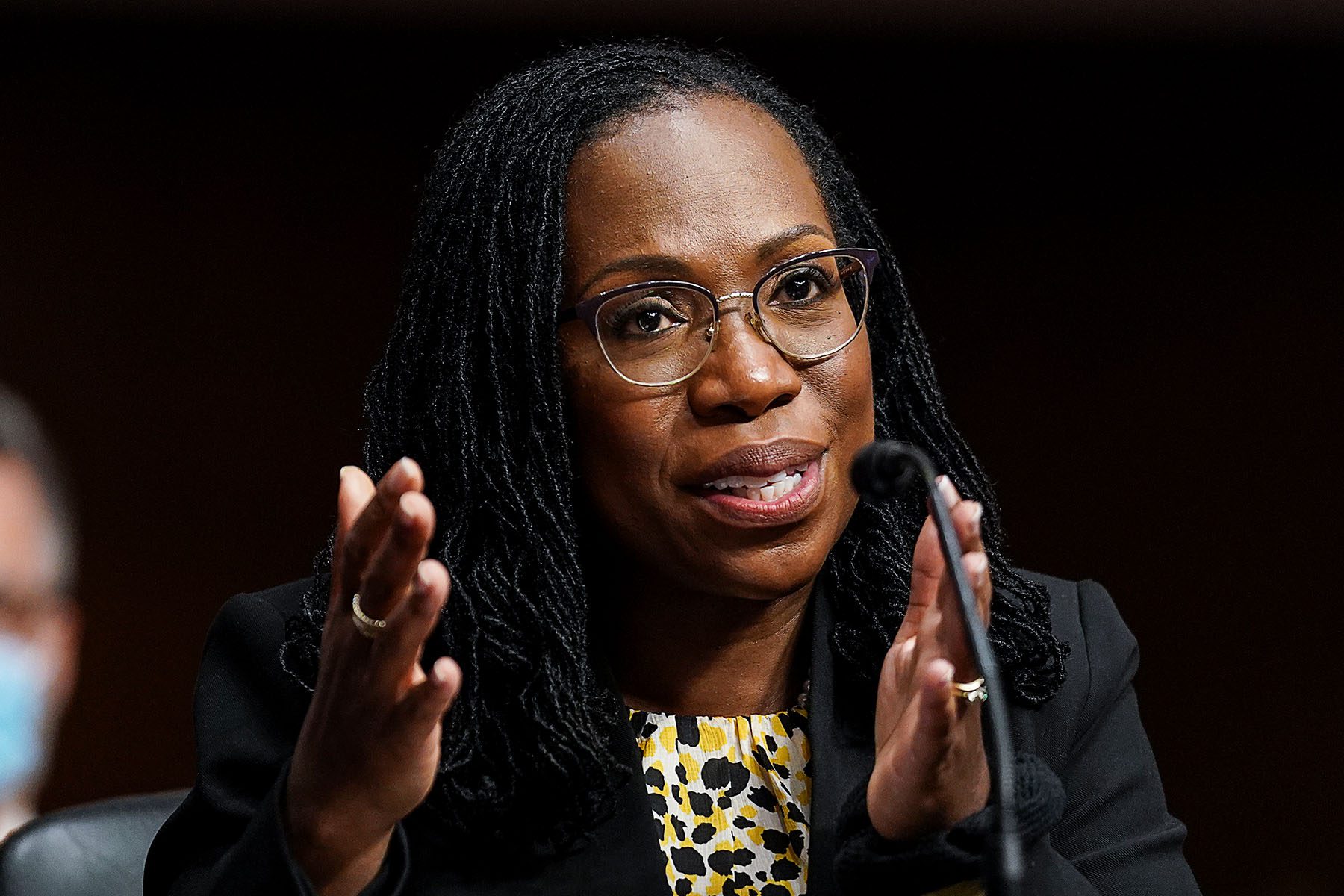On Friday, February 25, Judge Ketanji Brown Jackson became the first Black woman nominated to the Supreme Court. This story was published prior to her nomination.
Ketanji Brown Jackson was fresh out of a prestigious clerkship with U.S. Supreme Court Justice Stephen Breyer in 2000 when she took a job with a big law firm, Goodwin Procter, in Boston. Her first daughter, Talia, was born a few months later, and, like many new mothers, Brown found herself struggling to balance the demands of her work with the needs of her family.
“The firm was very supportive, but I don’t think it is possible to overstate the degree of difficulty that many young women and especially new mothers face in the law firm context,” Jackson said in a 2017 speech as part of the University of Georgia Law School’s Edith House Lecture Series, a program named for the first woman to graduate from the school.
“The hours are long. The workflow is unpredictable. You have little control over your time and your schedule, and you start to feel as though the demands of the billable hour are constantly in conflict with the needs of your children and your family responsibilities,” she said.
Jackson’s five-year-old speech offers insight into how she navigated the legal world as a mother and a Black woman during a time when few women of color held similar positions. The address also sheds light on how these work experiences shaped her journey to becoming a federal judge who is now being considered for a lifetime appointment to the Supreme Court to replace Breyer.
In her remarks, Jackson noted that the pathway for women and women of color in the legal profession can often be challenging. Statistics show they face barriers to advancing to more lucrative positions at major law firms. A 2019 retention survey by the National Association of Women Lawyers found that women’s representation in law firms is lower the higher the position: They represent 47 percent of associates, 30 percent of non-equity partners and 20 percent of equity partners, the most prominent positions.
For women of color and LGBTQ+ people, the numbers are more striking. Women of color make up 14 percent of associates, 5 percent of non-equity partners, and 3 percent of equity partners. LGBTQ+ people are 4 percent of associates and about 2 percent of non-equity and equity partners, according to the survey.
People in these underrepresented groups also report feeling more isolated and having fewer mentorship opportunities, all factors that might explain why more are moving away from working at large firms, Jackson said. In her case, the inflexibility of the work schedule became the deal breaker.
“That was a realization for me, the understanding that if I was going to leave my baby and go to work outside the home, I needed to find a law job that was not only fulfilling, but was also compatible with the needs of my family,” she said.
She left Goodwin Procter in 2002 and became “something of a professional vagabond, moving from place to place as my family needs and circumstances changed,” Jackson told University of Georgia law students. She worked as an assistant federal public defender in Washington, D.C., from 2005 to 2007, a job that she has said shaped how she approaches her work as a judge. In her 2021 confirmation hearing to become federal circuit judge, Jackson said she viewed the public defender position as an opportunity to help people in need and was struck by how little her clients understood the criminal legal process.
After another stint in private practice, Jackson was nominated by then-President Barack Obama to serve in a full-time capacity on his Sentencing Commission. She was confirmed to that post in 2010. It was the first of three times that she has gone through a Senate confirmation process.
“This for me was an opportunity of a lifetime, and it was well worth enduring what I can only say was the extremely nerve-wracking nomination and confirmation process,” she said at the University of Georgia. “I actually taught myself to knit as a way to channel my nervous energy during that time. If anybody wants a scarf, I’m your source.”
As vice chair of the commission, Jackson supported retroactive sentence reductions for thousands of people convicted of crack cocaine offenses. Her role on the commission, she said, paved the way for her nomination and 2013 confirmation to the U.S. District Court for the District of Columbia, where she served for eight years before moving up to her current position as a federal appellate judge last year.
In her speech, Jackson envisioned what her children might say about how she and her husband, Patrick Jackson, a surgeon at MedStar Georgetown University Hospital, work to instill their personal values. As parents, the Jacksons emphasize the importance of hard work, she said, and their family’s mantra is, “Do what you need to do before what you want to do.”
She and her husband also emphasize gratitude and respect, Jackson added.
“I feel so fortunate to have had the opportunities that I’ve had in life,” she said. “I believe it’s my obligation to teach my children to refrain from casting aspersions on others because of their life circumstances. In other words, as they often say in religious circles: I know that there but for the grace of God go I.”
Jackson also said she tells her daughters to be on the lookout for mentors, and noted the significance of her own mentors, including family members and teachers, as well as the judges she clerked for. She also pointed to leaders in history such as abolitionist Sojourner Truth, the first Black woman federal judge Constance Baker Motley, the first Black woman elected to Congress Shirley Chisholm and the first woman prime minister of India, Indira Gandhi, as sources of inspiration throughout her career, she said.
During her district court tenure, then-Supreme Court Justice Antonin Scalia died, leaving a vacancy on the high court. Jackson’s daughter Leila saw an opportunity for her mother, and she wrote Obama a letter:
“Dear Mr. President, while you are considering judges to fill Justice Scalia’s seat on the Supreme Court, I would like to add my mother Ketanji Brown Jackson of the district court to the list,” Jackson recited during her 2017 speech.
“I, her daughter Leila Jackson of 11 years old, strongly believe that she would be an excellent fit for the position. She is determined, honest and never breaks a promise to anyone, even if there are other things she’d rather do,” Jackson read from her daughter’s letter. “She can demonstrate commitment, and is loyal and never brags. I think she would make a great Supreme Court justice, even if the workload will be larger on the court or if you have other nominees. Please consider her aspects for the job. Thank you for listening.”
Though Jackson was shortlisted for the position, Obama nominated then judge-Merrick Garland to Scalia’s seat. Senate Republicans declined to move forward with the confirmation process, ultimately resulting in President Donald Trump filling the seat with Justice Neil Gorsuch. But her daughter’s letter gave Jackson a new perspective on her life and career.
“As I read Leila’s letter, I got a glimpse of my professional and personal life combined and what I saw made me feel as if my husband and I are well on our way to achieving success in both worlds.”







